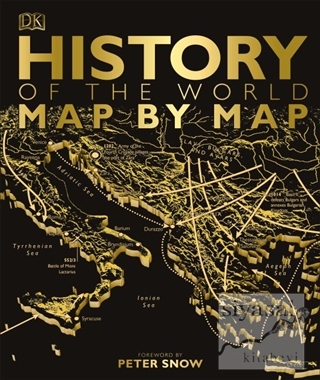
Much more than a history atlas, this book drops you right in the heart of the action, as 130 detailed maps tell the story of pivotal episodes in world history, from the first human migrations out of Africa to the race for space. After the foreword written by renowned broadcaster and historian Peter Snow, purpose-made regional and global maps present the history of the world as it happened, charting how events traced patterns on land and ocean - patterns of exploration, discovery, or conquest that created powerful empires, fragile colonies, or terrifying theatres of war. An interplay of text and graphics leads you around the page so that you can follow the story of civilizations through ancient, medieval, and modern times.
But not every page is full of maps. At key points in History of the World Map by Map, broad, sweeping introductions provide a chance to step back and look at entire periods, such as World War 2, or to explore overarching themes, such as the Industrial Revolution. Picture spreads, meanwhile, focus on epoch-defining moments or developments, such as fascism and communism, and the invention of printing.
Much more than a history atlas, this book drops you right in the heart of the action, as 130 detailed maps tell the story of pivotal episodes in world history, from the first human migrations out of Africa to the race for space. After the foreword written by renowned broadcaster and historian Peter Snow, purpose-made regional and global maps present the history of the world as it happened, charting how events traced patterns on land and ocean - patterns of exploration, discovery, or conquest that created powerful empires, fragile colonies, or terrifying theatres of war. An interplay of text and graphics leads you around the page so that you can follow the story of civilizations through ancient, medieval, and modern times.
But not every page is full of maps. At key points in History of the World Map by Map, broad, sweeping introductions provide a chance to step back and look at entire periods, such as World War 2, or to explore overarching themes, such as the Industrial Revolution. Picture spreads, meanwhile, focus on epoch-defining moments or developments, such as fascism and communism, and the invention of printing.





















